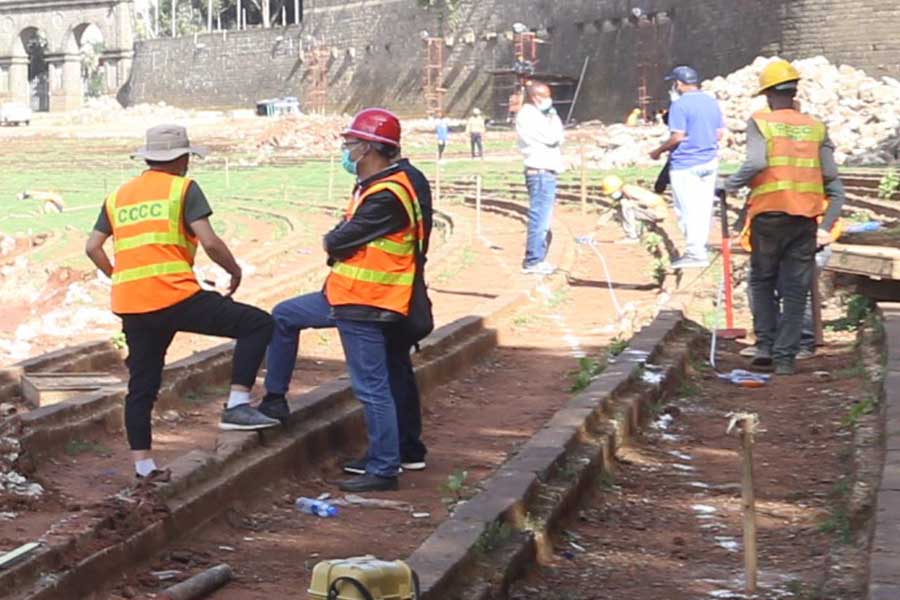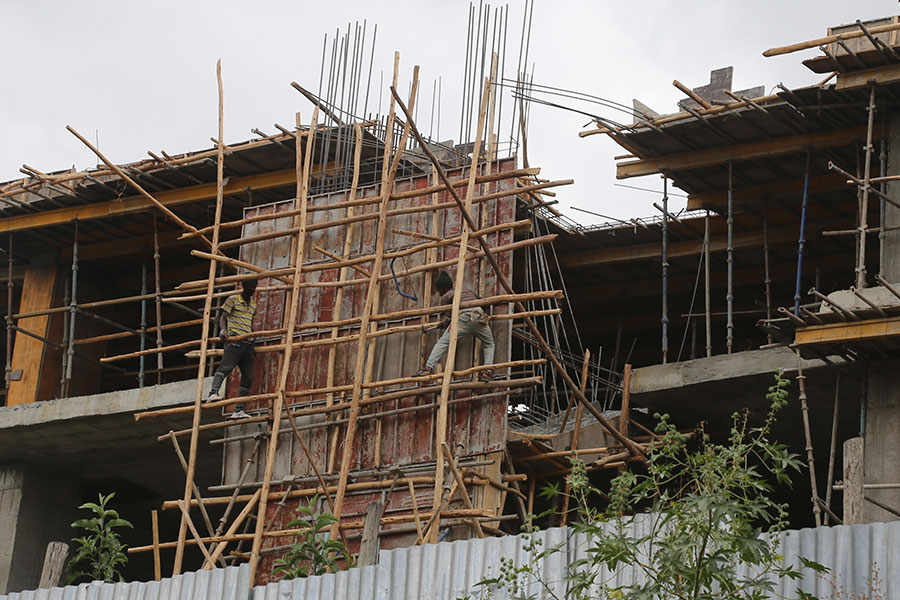
Fortune News | Jul 13,2025
Apr 16 , 2022
By RUTH TAYE (
FORTUNE STAFF WRITER
)
A study furnishing legal and policy frameworks to encourage subcontractors in the construction industry is underway, enhancing their involvement in projects where subcontracting remains relatively uncommon.
Subcontractors of various sizes and specialisations are vital to the success and viability of the construction industry, according to Dawit Mehari, deputy director-general of the Construction Managment Institute, a federal agency that hired the Ethiopian Institute of Architecture, Building Construction & City Development (EiABC) to undertake the study for 2.7 million Br.
The Institute's latest undertaking is part of a series of reforms to overhaul the construction industry. Three months ago, EiABC drew a legal framework for the Construction Projects Regulatory Authority, allowing local contractors to actively participate in international bids and mega-projects implemented by the state.
EiABC is committed to completing the study and handover the results to the Institute in six months. Four months ago, the Institute had invited four public universities and three associations for consultancy services and the preparation of working systems and legal policy documents. Only Hawassa University and EiABC responded to the call.
"Preparing the legal documents will widen opportunities for subcontractors' participation in big projects," said Denamo Addissie (PhD), chair of construction materials and engineering design at EiABC.
Officials say a legal framework that ensures inclusivity for local and small-scale contractors by larger firms and foreign contractors is necessary. The construction industry contributes nearly a fifth of Ethiopia's GDP, growing by an average of 11pc annually for the past decade. Construction companies are licensed under five grades, but a handful of contractors dominate the industry. Most large-scale projects are carried out by a few grade-one contractors and foreign firms, mainly Chinese owned. A fifth of the 23,000 registered contractors handles 80pc of all building projects, and 68pc of the road projects are carried out by 12pc of construction companies.
“Subcontractors are mostly excluded from participating in such projects,” said Dawit.
Over 45,000 subcontractors have registered under 10 categories, including plastering, tiling, painting and electrical works. Grade-four and five contractors also take on work as subcontractors. Industry players say subcontractors often have unequal negotiating positions due to the lack of a legal framework that defines the relationship between construction companies and subcontractors.
“This is pushing many subcontractors out of business,” says Biniam Ayalew, general manager of Building Finishers Plc, a company that specialises in metal and plastery works.
The company has not done any subcontracting in the last two years.
Abebe Dinku (PhD), a professor of civil engineering at Addis Abeba University, observed not all subcontractors operate with permits.
"Their bargaining leverage is limited compared to prime contractors," he said.
The absence of rules often leads to disputes between contractors and subcontractors. Industry observers say the risk of payment default and termination without notice is among the problems afflicting subcontractors.
"We're still waiting for payment for a job we did three years ago," Biniam told Fortune.
According to Etsub Ketema, a research and development expert at the Institute, the policy framework is expected to state the relationship between contractors and subcontractors and their responsibilities.
Rules are not streamlined is also a challenge for contractors, according to Biruk Shimelis, deputy general manager of Flintstone Engineering Plc, a construction firm established in 1991. Flintstone Engineering has done more than 80 projects, administering 2,000 staff.
Biruk says there are problems when it comes to taking responsibility, a sentiment echoing Dawit, who says subcontractors should be held accountable for failure to deliver projects without justification.
“The policy document under preparation is expected to hold incompetent subcontractors accountable," he said.
However, the subcontractor may not be able to deliver the work on time due to ineptitude or lack of payment, according to Biruk.
“Either case, the client suffers,” said Biruk.
Officials also emphasise the need for speciality subcontractors based on a specific craft, discipline, or construction activities.
The government must regulate the sector effectively and provide technical and financial assistance to foster the creation of specialised subcontractors, argues Abebe.
In recent years, the number of newly-established subcontractors has increased considerably. Close to 10,000 subcontractors organised as micro and small enterprises participated in the Addis Abeba low-cost housing scheme introduced 15 years ago. However, most of them are in multi-disciplinary construction and engineering services.
Officials hope the latest reform will allow subcontractors and construction companies to share the experience through ventures with foreign firms. Last month, the Ministry of Urban Development & Construction introduced a new directive to legalise joint venture partnerships between local contractors and global construction firms.
The directive also limits the number of contractors in a joint venture to no more than four – applying to domestic and foreign firms. A contractor entering an agreement will be required to own at least 25pc of the venture while restricting the partnerships to contractors having the same grade level. The Ministry has also introduced a new classification for contractors, simultaneously drafting a set of rules to limit the number of projects a contractor can take at a time.
Over 45,000 registered subcontractors hope the laws in the making will grant them improved negotiating positions with large construction firms.
PUBLISHED ON
Apr 16,2022 [ VOL
23 , NO
1146]

Fortune News | Aug 22,2020

Radar | Apr 16,2022

Radar | Apr 04,2020

Fortune News | Apr 17,2020

Fortune News | Jan 25,2020

Dec 22 , 2024 . By TIZITA SHEWAFERAW
Charged with transforming colossal state-owned enterprises into modern and competitiv...

Aug 18 , 2024 . By AKSAH ITALO
Although predictable Yonas Zerihun's job in the ride-hailing service is not immune to...

Jul 28 , 2024 . By TIZITA SHEWAFERAW
Unhabitual, perhaps too many, Samuel Gebreyohannes, 38, used to occasionally enjoy a couple of beers at breakfast. However, he recently swit...

Jul 13 , 2024 . By AKSAH ITALO
Investors who rely on tractors, trucks, and field vehicles for commuting, transporting commodities, and f...

Oct 25 , 2025
The regulatory machinery is on overdrive. In only two years, no fewer than 35 new pro...

Oct 18 , 2025
The political establishment, notably the ruling party and its top brass, has become p...

Oct 11 , 2025
Ladislas Farago, a roving Associated Press (AP) correspondent, arrived in Ethiopia in...

Oct 4 , 2025
Eyob Tekalegn (PhD) had been in the Governor's chair for only weeks when, on Septembe...